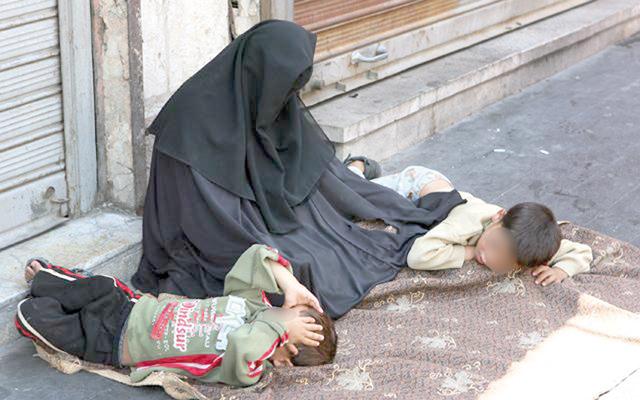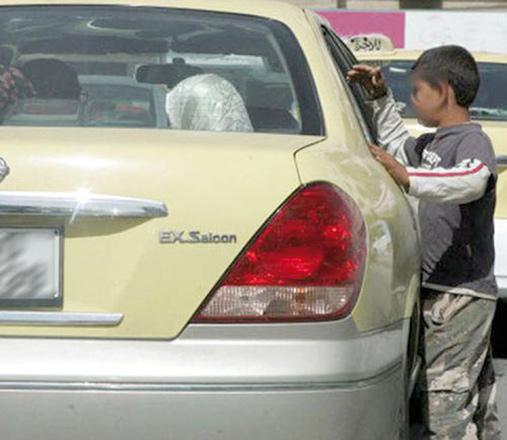You are here
Giving to panhandlers: A moral dilemma remains unsolved
By Maram Kayed - Dec 05,2020 - Last updated at Dec 05,2020

Women and children begging for money on the streets have become a common sight. Nearly 2,566 beggars have been arrested by anti-vagrancy cadres across the Kingdom since the beginning of 2020, according to the anti-vagrancy department. (File photo)
AMMAN — As the “blurred lines” between organised begging and humanitarian cases raise concerns on social media, sociologists and social workers say the tired, innocent faces of children asking for money, often times staged, still stirs the general public’s emotions.
“There is a sweet, innocent boy on my way to work whom I have developed somewhat of a friendship with, but knowing that any money I give him will go to his ‘boss’, I started giving him material things such as food and clothes,” said Mary Khuttar, a shop manager.
Khuttar, a 52-year-old who runs a job in Jabal Amman said that “sometimes you know that the money or things you are giving to those people might not actually help them, as their superiors in the crime group will confiscate them, but you cannot help but do your part to feel better”.
Maher Kloub, head of the Anti-Vagrancy Department at the Social Development Ministry said it is a difficult task to identify who is in real need.
“The problem is that both us as a specialised unit in the ministry and citizens no longer know who to help and who to arrest. Women holding babies next to garbage cans, children begging for money near traffic lights and people with disabilities asking for money on the streets have become common sights. Our teams have to look into each case to determine the correct procedures,” Kloub said
“Some vulnerable people were pushed to carry out the dirty work of organised crime groups, but in those instances, we have to cooperate with the Public Security Directorate because there is interrogative and law enforcement work to be done,” Kloub said.
Nahed Syouri, a sociologist, said that organised begging has “deprived society of its sympathy and empathy”.
“When organised begging first came out in the early 2000s, almost everyone was moved by the emotionally stimulating scenes that the groups staged to collect money. The little children who were seen crying over the gum that they were intending to sell was probably the most popular and successful trick of them all,” the sociologist said.
However, she said that as people started seeing these “staged scenes” in more than one area, they realised that they were tricked and began feeling sceptic towards anyone asking for help.
“I know a friend who was so moved that she gave a boy JD50 as she thought he no longer had a way of selling anything to provide himself with food and shelter, but after realising it was staged, she developed a hostile attitude towards anyone asking for help,” added Syouri.
In comments on social media, citizens asked the concerned authorities to protect the most vulnerable on the streets so that “no more heartbreaking scenes are seen all over Amman,” as put by Mohammad Ayed, a doctor, on Facebook.
Ayed said that “whether a beggar or not, each person stranded on the street must be provided with help”.
The doctor told a story of how he once felt “helpless” after seeing that two young boys were being harshly scolded by a man who he suspected was an older member of their crime group but that he “froze and could not do anything as the man looked dangerous”.
“Did these children choose this life? Of course not. Are they unworthy of our help because they are used in a chain of crime? No, as they are minors with no say or choice,” Ayed added.
Stuck in an “unmerciful loop”, as put by social worker Hisham Allan, those used by crime groups for organised begging “should be helped rather than despised”.
“I understand that citizens dislike being persistently nagged near traffic lights or even in workplaces — as some beggars enter cafes and restaurants to ask for money before being asked to leave — but what we do not comprehend is that if they do not come back with enough money that day, they will face dire consequences,” said Allan.
Nearly 2,566 beggars have been arrested by anti-vagrancy cadres across the Kingdom since the beginning of 2020. Among the arrested, 1,690 were adults with a majority of women and 876 juveniles, most of whom are boys, according to figures provided by the anti-vagrancy department.
“The little children I have worked with said they had to work every day, rain or shine, even in the most extreme weather conditions, until every box of tissues or whatever they were selling ran out. These people do not have a choice, as they cannot simply say ‘no’ for fear of starvation, physical harm or even murder,” Allan said.
Related Articles
AMMAN — Begging has recently taken on “multiple new forms”, according to Spokesperson of the Ministry of Social Development Ashraf Khreis, w
AMMAN — Organised crime groups have found “innovative” ways of begging to stir the general public’s emotions, according to the Social Develo
AMMAN — Beggars seeking handouts have become a familiar sight in Jordan, as their numbers reached around 4,000 in 2019, with the Anti-Vagran
















